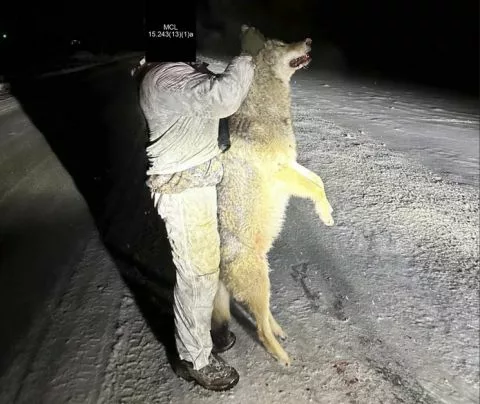- A county prosecutor will not bring charges in the January killing of an endangered gray wolf in southern Michigan
- The prosecutor called the killing an honest mistake by hunters who thought they were shooting a coyote
- State investigators still don’t know how the animal reached southern Michigan
No one will face charges for the January killing of an endangered gray wolf in southern Michigan.
Calhoun County Prosecutor David Gilbert told the Associated Press he is declining to file charges after concluding that the hunter and guide involved in the killing had “a reasonable and honest belief they were legally shooting a coyote.”
A DNR spokesperson confirmed the decision to Bridge Michigan, saying in a statement that Gilbert’s conclusion “was consistent with what the DNR found during its investigation into the matter.”
“Those involved appear to have reasonably believed they were shooting a coyote,” DNR spokesperson Ed Golder said. “The investigation revealed no information to indicate they should have expected there would be a wolf in the part of Michigan where they were hunting.”
Gilbert received the case in early June after a months-long investigation into the wolf’s death in Fredonia Township, an area south of Marshall and hundreds of miles south of the wolf’s home range.
A Marshall area man told investigators with the Department of Natural Resources that he shot the 84-pound male wolf after mistaking it for a coyote, an animal that rarely reaches 40 pounds.
Related:
The man, a novice coyote hunter, had been heat-scoping for coyotes in a farm field with a much more experienced hunter, who coached him through the shot.
A taxidermist was also involved in the case, accepting the wolf’s carcass and then proceeding to mount it while state wildlife officials were in the midst of investigating.
The case sparked intrigue because wolves don’t live in southern Michigan, and to reach Calhoun County on its own, this one would have needed to either cross the Straits of Mackinac, which haven’t frozen over in either of the past two winters, or travel around lakes Michigan or Huron by land through some densely populated areas.
Public records secured by Bridge Michigan later revealed that the animal also had a trap wound on its front paw, indicating that it may have been relocated by humans.
Wolves are deeply politicized in Michigan and across the country, with some revering them and lobbying for their protection while others revile them and push for the government to legalize wolf hunting. Occasionally, Upper Peninsula lawmakers and other wolf-hunting supporters have suggested that some of the animals should be moved to the Lower Peninsula.
After investigating, state wildlife officials said they were unable to determine how the wolf got to southern Michigan or how it got the trap wound.
Wolves are an endangered species in the Great Lakes, which makes killing them a federal offense punishable by up to a year in prison and a $50,000 fine. The sole exception is for animals that pose a direct and immediate threat to human life.
But elected county prosecutors have broad discretion over whether to bring charges.
In the weeks after DNR officials announced the killing, a group of Republican state lawmakers publicly urged officials not to punish the hunters. Wolf advocates, meanwhile, have pushed for the opposite.
On Friday, one expressed disappointment about Gilbert’s decision, noting that the Endangered Species Act makes no exception for mistakenly shooting a protected animal.
“The bottom line is, the first line of any hunter is, know your target,” said Nancy Warren, executive director of the National Wolfwatcher Coalition. “You don’t shoot till you know your target.”
Once numbering as high as 2 million across the U.S., wolves were exterminated from many states, including Michigan, by the mid-1900s. Now federally protected across 45 states, their numbers have climbed to about 6,000 in the contiguous U.S. and 7,000 to 11,000 in Alaska. Michigan’s population, according to the latest DNR estimate announced this week, is 762, all of them in the Upper Peninsula.
The investigation into the January wolf kill was complicated by a slow start and damaged evidence, after a DNR officer initially refused a request from within his agency to confiscate the animal’s carcass. By the time that decision was reversed, a taxidermist had already butchered the animal in preparation for mounting.
While the DNR is no longer actively investigating the case, it is still accepting additional information and has referred tipsters to the Report All Poaching hotline, (800) 292-7800.





